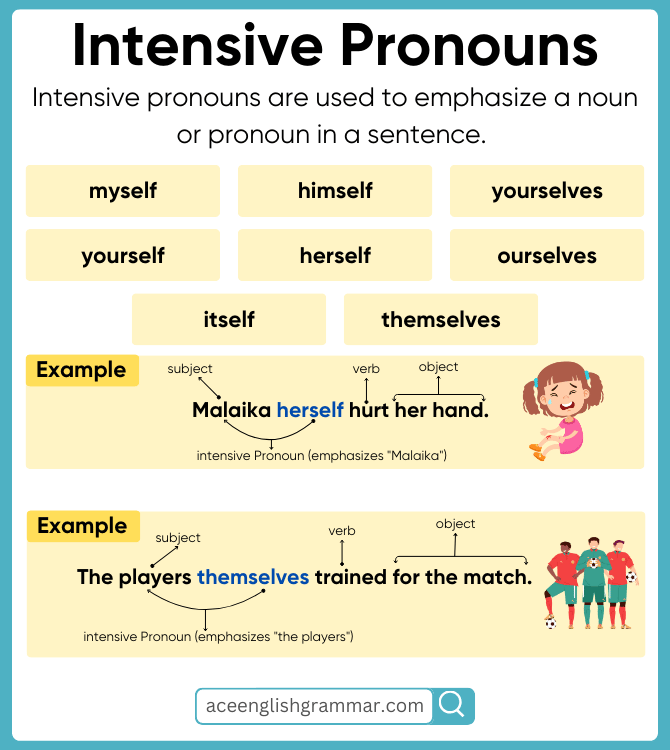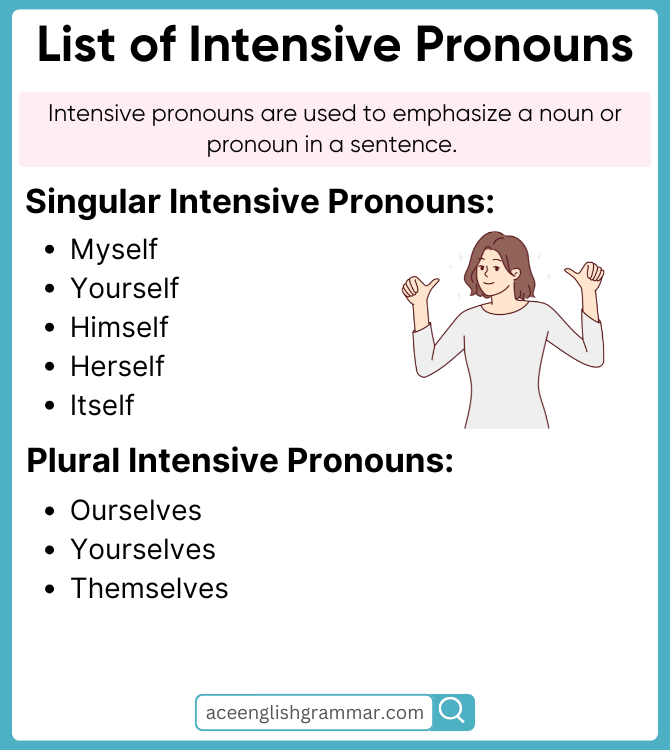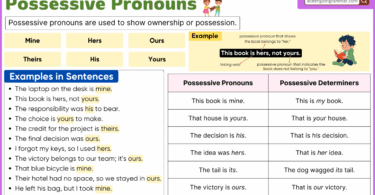Intensive pronoun emphasize a noun or pronoun in a sentence. Words like myself, yourself, himself, herself, and themselves add emphasis but do not change the sentence’s meaning. Many learners confuse them with reflexive pronouns, but their function is different. Understanding intensive pronoun helps improve clarity and emphasis in writing. This blog post helps learn intensive pronouns with definitions, rules, and examples for better English grammar.
Intensive pronouns are used to emphasize a noun or pronoun in a sentence. They end in “-self” (singular) or “-selves” (plural) and highlight the subject without altering the sentence’s fundamental meaning.
Table of Contents
List of Intensive Pronouns
The intensive pronouns in English are:
Singular Intensive Pronouns:
- Myself
- Yourself
- Himself
- Herself
- Itself
Plural Intensive Pronouns:
- Ourselves
- Yourselves
- Themselves

Rules for Using Intensive Pronouns
- Always Emphasize the Subject
- Fatima herself fixed the broken chair.
- Do Not Change the Meaning of the Sentence
- I myself will handle the situation.
- Never Use as an Object
- Incorrect: He gave the book to myself.❌
- Correct: He gave the book to me.✅
- Avoid Redundancy
- Incorrect: The students themselves solved the problem by themselves.❌
- Correct: The students themselves solved the problem.✅
Examples of Intensive Pronoun in Sentences
- Zayd himself cleaned the entire house.
- She herself admitted her mistake.
- The cat itself opened the door.
- We ourselves arranged the event.
- You yourself should know the truth.
- They themselves handled the crisis.
- Amina herself baked the cake.
- I myself wrote this book.
- The children themselves decorated the room.
- The president himself attended the meeting.
- You yourselves must be careful.
- The machine itself malfunctioned.
- The witnesses themselves testified in court.
- She herself learned Arabic fluently.
- The driver himself repaired the vehicle.
- We ourselves decided to leave early.
- The chef himself cooked the meal.
- They themselves created the project.
- I myself verified the documents.
- You yourself should practice daily.
Intensive Pronoun vs. Reflexive Pronoun
| Feature | Intensive Pronoun | Reflexive Pronoun |
|---|---|---|
| Purpose | Emphasize the subject | Act as objects of verbs |
| Sentence Impact | Can be removed without affecting meaning | Cannot be removed without making the sentence incorrect |
| Example | She herself cleaned the house. | She cleaned herself after work. |
Common Mistakes and How to Fix Them
- Using an intensive pronoun incorrectly as an object
- Incorrect: He gave the book to myself.❌
- Correct: He gave the book to me.✅
- Using an intensive pronoun without a proper antecedent
- Incorrect: Himself fixed the problem.❌
- Correct: Zaid himself fixed the problem.✅
- Confusing intensive and reflexive pronouns
- Incorrect: We enjoyed ourselves at the party (Incorrect if emphasis is intended).❌
- Correct: We ourselves hosted the party.✅
Exercise on Intensive Pronouns
Fill in the blanks with the correct intensive pronoun (myself, yourself, himself, herself, itself, ourselves, yourselves, themselves):
- I _____ baked this cake from scratch.
- She _____ painted the entire house without help.
- The manager _____ approved the new policy.
- You _____ should be proud of your achievements.
- The students _____ organized the school event.
- He _____ fixed the broken chair.
- The machine _____ shut down after overheating.
- We _____ planned the entire trip.
- The artist _____ designed this masterpiece.
- They _____ decided to donate to charity.
Answers:
- myself
- herself
- himself
- yourself
- themselves
- himself
- itself
- ourselves
- himself
- themselves
FAQs
Intensive pronouns are used to emphasize a noun or pronoun, adding focus without changing the sentence’s meaning. They highlight the subject for clarity and emphasis.
Yes, removing an intensive pronoun does not alter the fundamental meaning of a sentence. For example, “Ali himself built the house” can be rewritten as “Ali built the house” with no loss of meaning.
An intensive pronoun emphasizes the subject, while a reflexive pronoun acts as an object of the verb. For example, “She herself cooked dinner” (intensive) vs. “She cooked herself a meal” (reflexive).
Yes, “itself” is an intensive pronoun when used for emphasis. For example, “The city itself was beautiful.”
No, intensive pronouns are optional. They add emphasis but can be removed without affecting the sentence’s core structure.
Conclusion
Intensive pronoun is a powerful tool for adding emphasis in writing and speech. They help clarify responsibility, highlight subjects, and enhance communication. By understanding their usage and avoiding common mistakes, English learners can improve their grammar and express ideas more effectively.
Read More



